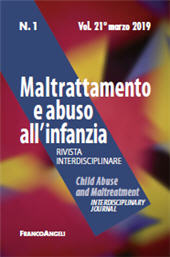Using the Attachment Style Interview to explore Non-Suicidal Self-Injury in men : the representational pathway from childhood traumaon-suicidal self-injury
23-37 p.
Empirical evidence suggests complex associations between childhood trauma and Non-Suicidal Self-Injury (NSSI), with attachment emphasised as a conceptual link. However, studies exploring the experience of individuals who self-injure are limited, with men high-lighted as an under-researched group. The Attachment Style Interview (ASI) was carried out with four young men, each with histories of adolescent NSSI. The ASIs were scored and categorised, as well as analysed more qualitatively, in the form of illustrative case vignettes, to provide further attachment-related insights into males' NSSI. None of the young males was securely attached. Going beyond the categories, the vignettes revealed specific issues of rejection, abandonment, loss and anger. The attachment approach also provided linkages with adverse early experiences, including poor care and parentification.
Conceptually, these findings reveal specific attachment issues which may be important in the representational pathway from childhood trauma to NSSI. [Publisher's text].
Evidenze empiriche suggeriscono associazioni complesse tra il trauma infantile e l'autolesionismo (NSSI) con l'attaccamento enfatizzato come un collegamento concettuale. Tuttavia gli studi che esplorano l'esperienza di autolesionisti sono limitati, con gli uomini che emergono come un gruppo limitatamente investigato. L'Attachment Style Interview (ASI) è stato somministrato a 4 giovani uomini con esperienza di NSSI iniziata in adolescenza. È stato effettuato lo scoring, la categorizzazione e l'analisi dell'ASI in modo qualitativo, nella forma di vignette di casi esemplificativi, al fine di fornire ulteriori approfondimenti, correlati all'attaccamento, in merito all'NSSI degli uomini. Nessuno dei giovani uomini ha riportato uno stile di attaccamento sicuro. Andando oltre le categorie, i casi illustrati tramite vignette hanno rilevato specifici problemi di rifiuto, abbandono e rabbia.
L'approccio basato sull'attaccamento ha anche evidenziato collegamenti con esperienze di cura infantile avverse, inclusi cure inadeguate e inversione del ruolo parentale in tutti i partecipanti. Concettualmente questi risultati rilevano specifiche problematiche riguardanti l'attaccamento che potrebbero ricoprire importanza nel passaggio dal trauma durante l'infanzia e l'NSSI. [Testo dell'editore].
Ist Teil von
Maltrattamento e abuso all'infanzia : 21, 1, 2019-
Artikel aus derselben Ausgabe (einzeln erhältlich)
-
Informationen
ISSN: 1972-5140
KEYWORDS
- Attachment Style Interview, ASI, autolesionismo, ferita autoinflitta, salute mentale
- Attachment Style Interview, ASI, NSSI, Self-Injury, Male, Mental Health



